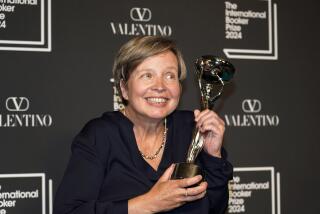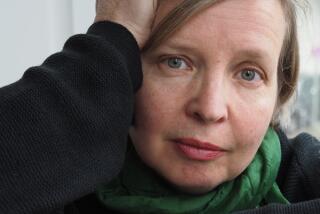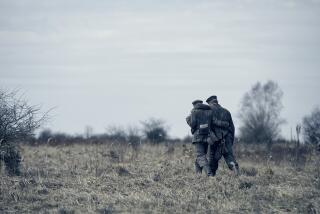Nobel Laureate Heinrich Boell Dies at 67
- Share via
COLOGNE, West Germany — Heinrich Boell, the embittered young German infantryman who became a winner of the Nobel Prize for Literature for his penetrating and satiric attacks on war, Nazis and the materialism of his homeland, died Tuesday at his home in the Eifel Mountains near here. He was 67.
A spokeswoman for his publisher, Kiepenheuer and Witsch, said Boell died in Bornheim shortly after he was released from a Cologne hospital following vascular surgery. She declined to disclose the cause of death. Boell had been ill for some time.
An outspoken and often controversial proponent of leftist causes, Boell published more than 40 novels, short stories and radio plays. His works were translated into 45 languages, including Russian.
He was awarded the Nobel literature prize in 1972, the first German to be presented the honor since Thomas Mann received it in 1929.
In presenting the award, the Swedish Academy of Arts and Sciences cited Boell “for his writing which, through its combination of its broad perspective on his themes and a sensitive skill in characterization, has contributed to a renewal of German literature.”
A ‘Frightful Fate’
In accepting the award, Boell told of his struggles as a disillusioned, war-weary veteran who, he later recalled, had been burdened “by the frightful fate of being a soldier and having to wish that the war might be lost.”
He told the Nobel Prize ceremony: “The way has been long for me here. Like millions of others I came home from the war with empty hands. But I had the passion to write and keep on writing.”
Boell’s major works included “The Lost Honor of Katharina Blum,” which critics suggested reflected the lives of the notorious Baader-Meinhof urban guerrilla gang that terrorized West Germany in the 1970s. The book was seen as a reflection of Boell’s concern over moves to suppress civil rights in the effort to crush urban terrorism.
Boell’s first short novel was “The Train Was on Time” (1947), which chronicles the last days in the life of a young German soldier who returns to the Russian front after a furlough. Resigned to his death, the soldier tries to live as intensively as possible beforehand.
Born Dec. 21, 1917, in Cologne, the youngest of eight children of a sculptor and cabinetmaker, Boell ranked as West Germany’s first angry young man, and many considered him the republic’s conscience.
He was drafted into the German army in 1938 after he had worked in the book trade for a year. He fought on both the Western and Eastern fronts and was wounded three times.
The American Army captured him in 1944. After his release following the war, Boell returned to Cologne and worked as a cabinetmaker and began writing.
In the immediate postwar years, Boell studied German linguistics at Cologne University. In 1947 his short stories started appearing in various newspapers and on radio programs.
He founded a film society in 1971 and was the publisher of works by Soviet novelist Alexander I. Solzhenitsyn in 1974.
Having won a reputation for his anti-war books, Boell turned his critical eye on West Germany’s startling economic recovery, with a satirical collection of short stories titled “Dr. Murke’s Collection of Silences, and Other Satires.”
“Billiards at Half Past Nine” followed and many critics considered it Boell’s best book. It tells the story of three generations of a family of German architects. The central character, Robert Faehmel, by destroying an abbey built by his father, protests what he believes to be the Catholic Church’s tolerance of the Nazis.
Boell was a longtime supporter of the nation’s Social Democratic Party, and in 1983 caused a stir when he announced he would vote for the radical environmentalist Greens party.
At the time, Boell said he felt that the Greens’ fresh, unorthodox approach should be represented in Parliament. He added that he was perplexed by the hostility to intellectuals he had found in the country’s mainstream political parties.
Boell joined West Germany’s anti-nuclear movement in the 1980s, campaigning against deployment of new U.S. missiles.
Boell’s survivors include his wife, Annemarie, an author of children’s books, and two sons, Rene, 37, who runs a small publishing firm, and Vincent, 35, who works in Cologne. A third son, Raimund, died in 1982.
More to Read
Sign up for our Book Club newsletter
Get the latest news, events and more from the Los Angeles Times Book Club, and help us get L.A. reading and talking.
You may occasionally receive promotional content from the Los Angeles Times.










